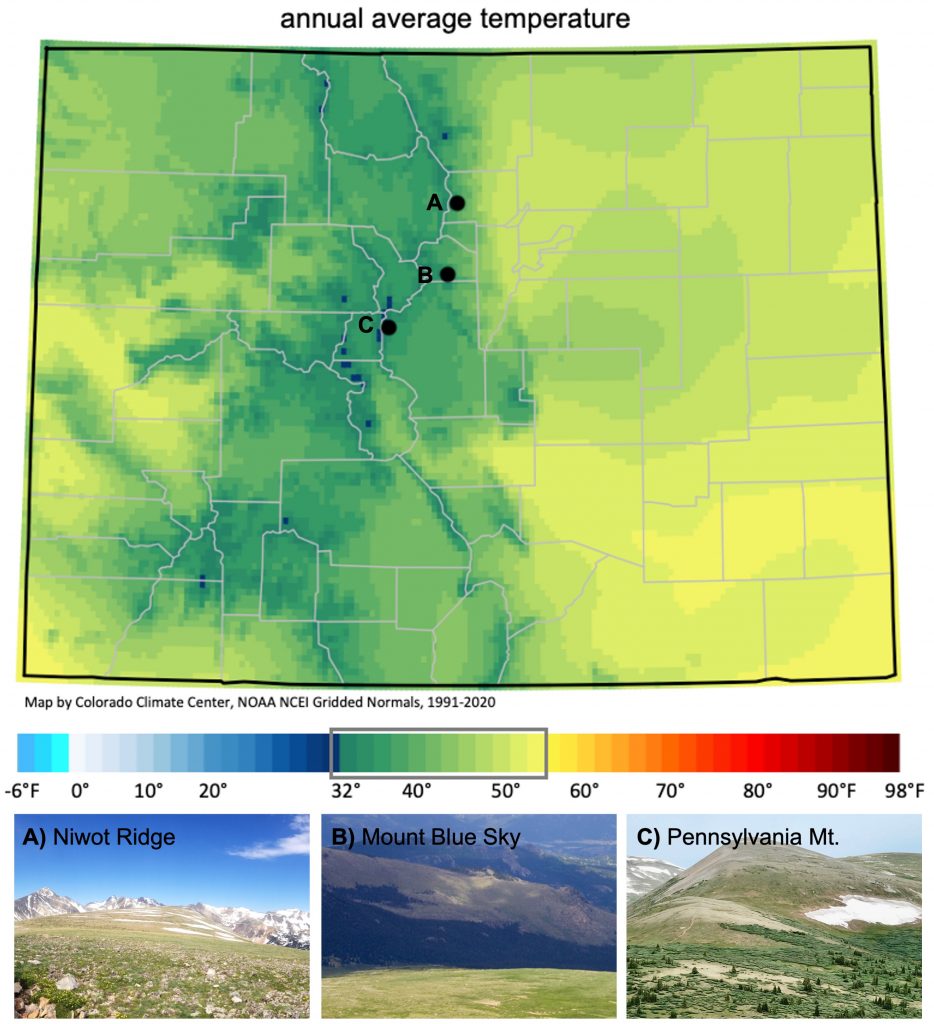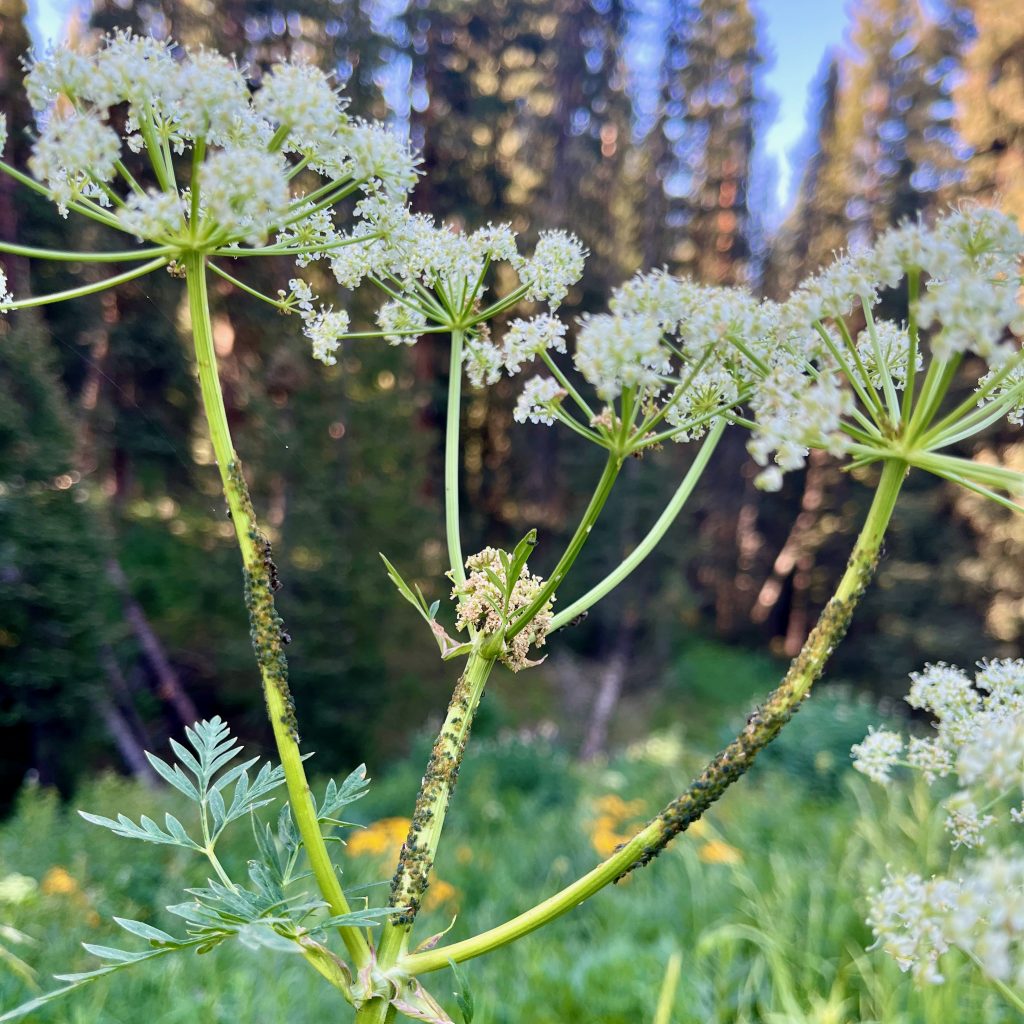Research Overview
Anthropogenic climate change is one of the most pressing global challenges in the 21st century. Our lab studies physiological, ecological, and evolutionary factors that influence the capacity of organisms to respond to these changes. In doing so, we aim to provide a framework for predicting the impacts of climate change in natural and managed ecosystems.
Plant ecophysiological responses to climate variability
Comparing physiological tolerances among organisms across broad climate gradients can provide insight into tradeoffs that affect plant responses to climate change. Ongoing projects in the Becklin Lab aim to (1) quantity plasticity in plant functional traits, (2) identify traits that contribute to variation in plant fitness in different environments, and (3) compare the potential for different plant species or populations to tolerate or adapt to environmental change.

We focus primarily on alpine ecosystems, which are viewed as “sentinels” for tracking the impacts of climate change. In collaboration with Drs. Candace Galen (University of Missouri) and Nicole Miller-Struttmann (Webster University), we are using long-term phenological data to infer plant sensitivity to warming and altered precipitation regimes in different alpine communities in the Colorado Rocky Mountains. Spatiotemporal variation in plant functional traits related to carbon assimilation, nutrient acquisition, and drought tolerance can provide insight into physiological mechanisms that underlie species-level climate responses.
Other related projects explore plant physiological responses to rising CO2, altered nutrient regimes, and other aspects of global change in native and invasive Yellowstone grasses (collaboration with Dr. Doug Frank, SU), poplar biofuel crops (collaboration with Dr. Heather Coleman, SU), and using plant specimens preserved packrat middens from arid ecosystems in western North America.
Global change effects on plant-microbe interactions
Soil microbes play a crucial role in shaping terrestrial plant communities through effects on resource availability, competitive interactions, and plant stress responses. However, microbes themselves are sensitive to environmental conditions and variation in the diversity or function of microbial communities may feedback to influence plant responses to climate change. Recent and ongoing field and greenhouse projects aim to (1) compare the resilience of different microbial groups to variation in climate, (2) link soil microbial activity to plant physiology under different environmental conditions, and (3) characterize shifts in plant-soil feedbacks that could affect resilience to climate change. Student projects have focused on different aspects of this theme:

- Environmental constraints on soil microbial activity in dry alpine meadows
- Drought resistance and functional diversity within alpine soil microbial communities
- Drought effects on plant-microbe interactions across host populations
- Resilience of mycorrhizal associations in diploid and tetraploid alpine buttercups
- Nutrient conditions mediate mycorrhizal effects on biofuel traits in poplar
Eco-evolutionary dynamics in multi-trophic interactions
Plants live and evolve in complex communities comprised of many interacting species, and these interaction webs can facilitate or constrain how organisms respond to rapid climate change. However, biotic interactions can shift with rising temperatures, altering eco-evolutionary dynamics and network stability in ways that are challenging to predict. My lab is studying multi-trophic interaction webs in two model systems. Our goals are to (1) identify traits that link above- and belowground interactions involving plant mutualists and consumers, (2) compare the resilience of these interactions to different climate factors, and (3) assess the fitness consequences of multi-trophic interactions across space and time to better predict organismal responses to anthropogenic change.

We use Polemonium viscosum as a model ecological system to explore climate impacts on above- and belowground interactions. Previous work indicates that mycorrhizal fungi influence key floral traits that mediate interactions with bumblebee pollinators and ant consumers. Climate change may alter these dynamics by exacerbating physiological trade-offs within host plants and/or by shifting the abundance of key ecological players. Recent projects focus on the the impacts of increased ant abundance with warming on soil microbes and subsequent plant-soil feedback.
In collaboration with Dr. Emily Mooney (University of Colorado Colorado Springs) and Dr. Christie Bahlai (Kent State University), we recently started a new project examining the effects of warming on multi-trophic interactions in an integrated plant-aphid system. Aphids are important herbivores in both natural and managed ecosystems. Plant-microbe and ant-aphid interactions are hypothesized to influence aphid population dynamics, making this an ideal system for studying the eco-evolutionary consequences of warming within a multi-trophic network.
This project is supported by a grant from the Molecular Observatory Network (MONet), an open science network developed by the Environmental Molecular Sciences Laboratory to better understand climate effects on soil functional processes, and by a grant from the National Science Foundation’s Integrative Organismal Systems Program (IOS-2428736).

Learn more about methods used in our research and access published datasets.
